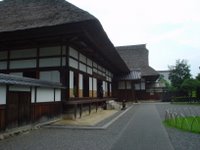 I'm now back in Ashikaga, Japan. After a long flight, I cleared customs at Narita in time to get the 15:15 long-distance bus direct to Ashikaga (for only ¥4300!), arriving by 18:00 after only one stop at the Sano Premium Outlet Mall. The traffic was slowest on the dogleg through northeastern Tokyo (past Disneyland), but nearly as bad on strip-mall-lined National Route 50 between Sano and Ashikaga at rush hour. My wife and I celebrated by going out to eat at our favorite local fish (and fine sake) restaurant: うおえ (魚恵)—although I had buta kakuni 'braised pork belly' as insurance against the cold in our underheated apartment. We were the only customers at the counter (February is their slowest month) and got to chat with the sushi chef, who learned his trade in San Francisco and Maui.
I'm now back in Ashikaga, Japan. After a long flight, I cleared customs at Narita in time to get the 15:15 long-distance bus direct to Ashikaga (for only ¥4300!), arriving by 18:00 after only one stop at the Sano Premium Outlet Mall. The traffic was slowest on the dogleg through northeastern Tokyo (past Disneyland), but nearly as bad on strip-mall-lined National Route 50 between Sano and Ashikaga at rush hour. My wife and I celebrated by going out to eat at our favorite local fish (and fine sake) restaurant: うおえ (魚恵)—although I had buta kakuni 'braised pork belly' as insurance against the cold in our underheated apartment. We were the only customers at the counter (February is their slowest month) and got to chat with the sushi chef, who learned his trade in San Francisco and Maui.In the airport waiting for departure I started reading Orhan Pamuk's novel Snow, one of the best I've read in a long, long time. During one passage of highly charged conversation that I was reading today, I suddenly recalled my similarly intense engagement with Thomas Mann's The Magic Mountain during the first month or so of my time studying Romanian at the Defense Language Institute in Monterey, California. Here's one short summary of Mann's opus:
A young bourgeois man visits his cousin in a mountain sanitarium where he 'falls ill' and struggles with the opposing forces of rationalism, faith, aestheticism, and common sense embodied by the other patients before rushing into World War I. The novel depicts the various cultural and intellectual currents swirling around in the soul of pre-World War I Europe.And here's how Publisher's Weekly summarizes Snow:
A Turkish poet who spent 12 years as a political exile in Germany witnesses firsthand the clash between radical Islam and Western ideals in this enigmatically beautiful novel. Ka's reasons for visiting the small Turkish town of Kars are twofold: curiosity about the rash of suicides by young girls in the town and a hope to reconnect with "the beautiful Ipek," whom he knew as a youth. But Kars is a tangle of poverty-stricken families, Kurdish separatists, political Islamists (including Ipek's spirited sister Kadife) and Ka finds himself making compromises with all in a desperate play for his own happiness. Ka encounters government officials, idealistic students, leftist theater groups and the charismatic and perhaps terroristic Blue while trying to convince Ipek to return to Germany with him; each conversation pits warring ideologies against each other and against Ka's own weary melancholy. Pamuk himself becomes an important character, as he describes his attempts to piece together "what really happened" in the few days his friend Ka spent in Kars, during which snow cuts off the town from the rest of the world and a bloody coup from an unexpected source hurtles toward a startling climax. Pamuk's sometimes exhaustive conversations and descriptions create a stark picture of a too-little-known part of the world, where politics, religion and even happiness can seem alternately all-consuming and irrelevant. A detached tone and some dogmatic abstractions make for tough reading, but Ka's rediscovery of God and poetry in a desolate place makes the novel's sadness profound and moving.Sure enough, in an author interview posted by Random House, Pamuk mentions Mann as one of his major influences.
AAK: Who are some of the writers and artists who have influenced you?
OP: I am forty-eight, and at this age the idea of influence makes me nervous. I’d rather say that I learn and pick-up things from other authors. I’ve learned from Thomas Mann that the key to pleasures of historical fiction is the secret ar[t] of combining details. Italo Calvino taught me that inventiveness is as important as history itself. From Eco, I’ve learned that the form of the murder mystery can be gracefully used. But I have learned most from Marguerite Yoursenar; she wrote a brilliant essay about the tone and language in historical fiction.
No comments:
Post a Comment